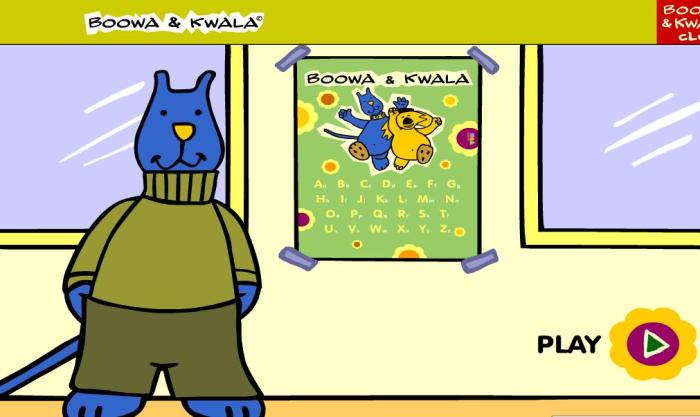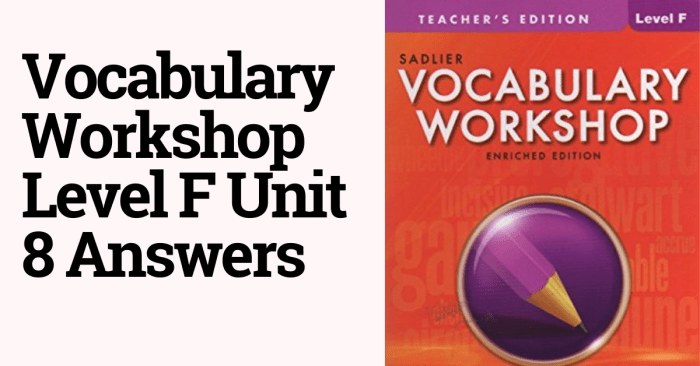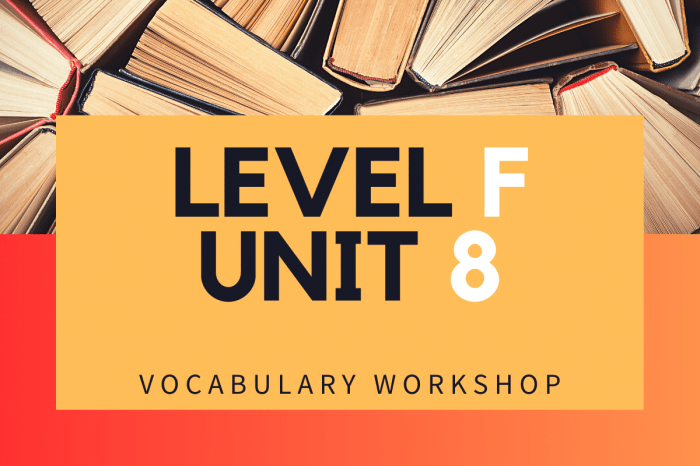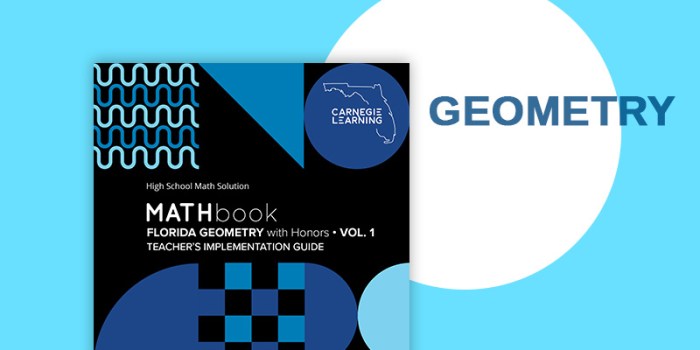Welcome to the captivating world of vocab workshop level f unit 8! This unit delves into the realm of vocabulary, empowering learners to expand their linguistic horizons and master the art of effective communication.
Through a comprehensive exploration of engaging strategies, interactive exercises, and cultural connections, we will embark on a journey to unlock the secrets of vocabulary building, ensuring that every word becomes a tool for expression and understanding.
Define ‘Vocab Workshop Level F Unit 8’
Vocab Workshop Level F Unit 8 is a comprehensive vocabulary-building resource designed for learners at the intermediate level of English language proficiency. It aims to expand their vocabulary and enhance their communication skills in various contexts.
The unit focuses on a wide range of vocabulary related to the theme of “The Natural World.” Learners will encounter words and phrases pertaining to different aspects of nature, including animals, plants, ecosystems, and environmental issues.
Target Audience
Vocab Workshop Level F Unit 8 is primarily intended for intermediate English learners who have a basic understanding of the language and are looking to improve their vocabulary and communication skills in a specific context.
Overview of Vocabulary
The vocabulary covered in this unit includes words and phrases related to the following s:
- Animals
- Plants
- Ecosystems
- Environmental Issues
Learners will explore the meanings of these words and phrases, learn how to use them in context, and practice their pronunciation and spelling.
Examples and Methods for Teaching Vocabulary
Effective vocabulary instruction involves introducing new words in a meaningful and engaging manner, and reinforcing their learning through various activities and exercises. Here are some strategies to consider:
Introducing New Vocabulary
- Contextualize words:Introduce new words within a meaningful context, such as a story, article, or conversation.
- Use visuals:Pictures, charts, or diagrams can help students visualize and understand the meaning of new words.
- Provide definitions and examples:Clearly define new words and provide examples of how they are used in different contexts.
- Use synonyms and antonyms:Explaining the relationships between words helps students build their vocabulary.
Reinforcing Vocabulary Learning
- Games and activities:Word games, puzzles, or role-playing activities can make vocabulary learning fun and engaging.
- Interactive exercises:Online or offline exercises, such as fill-in-the-blanks or matching exercises, help students practice and reinforce new words.
- Worksheets and activities:Worksheets can provide structured practice, while activities like writing sentences or creating stories using new words encourage active recall.
- Repeated exposure:Regularly reviewing and using new words in different contexts helps students retain them better.
Assessment and Evaluation
Assessing students’ vocabulary knowledge and evaluating their progress is crucial for identifying areas of improvement and enhancing teaching strategies.
To assess students’ vocabulary knowledge, teachers can employ various techniques, such as:
Informal Assessment
- Observations:Monitor students’ use of vocabulary in class discussions, written work, and presentations.
- Quick Quizzes:Conduct short quizzes with multiple-choice or fill-in-the-blank questions to gauge students’ understanding of new words.
- Student Journals:Encourage students to maintain journals where they record new words they encounter and write sentences using them.
Formal Assessment
- Vocabulary Tests:Design tests that include a mix of question types, such as matching, definition, and sentence completion, to assess students’ knowledge of vocabulary words.
- Writing Assignments:Analyze students’ writing samples for the use of new vocabulary and their ability to apply it appropriately.
- Presentations:Ask students to give presentations on specific vocabulary words, explaining their meanings and demonstrating their usage.
Technology Integration

Technology offers a vast array of tools that can revolutionize vocabulary learning. Online resources and apps provide interactive and engaging platforms that cater to diverse learning styles and preferences.
These tools not only expand vocabulary but also enhance comprehension, pronunciation, and retention. They provide instant feedback, personalized learning paths, and gamified experiences that make learning enjoyable and motivating.
Online Resources and Apps
- Vocabulary.com: An extensive online platform with a vast database of words, interactive exercises, and personalized learning plans.
- Quizlet: A popular app that allows users to create and share flashcards, play games, and track their progress.
- Duolingo: A gamified language learning app that incorporates vocabulary acquisition through engaging lessons and interactive exercises.
- Google Translate: A versatile tool that provides instant translations and definitions, facilitating the exploration of new words in context.
Best Practices
- Integration with Instruction: Seamlessly integrate technology into vocabulary lessons to supplement and enhance traditional teaching methods.
- Personalized Learning: Leverage technology to tailor learning experiences to individual student needs and learning styles.
- Interactive Engagement: Utilize interactive exercises, games, and simulations to make learning engaging and memorable.
- Progress Tracking: Use technology to monitor student progress and provide timely feedback to inform instruction and support students.
Lesson Plan Design
To effectively teach vocabulary from ‘Vocab Workshop Level F Unit 8’, a well-structured lesson plan is essential. This plan should Artikel clear learning objectives, engaging activities, and appropriate assessment strategies that cater to diverse learner needs.
Objectives
The lesson plan should begin by establishing clear learning objectives aligned with the unit’s vocabulary goals. These objectives should be specific, measurable, achievable, relevant, and time-bound (SMART).
Activities
The lesson plan should incorporate a variety of activities that actively engage students in vocabulary learning. These activities could include:
- Interactive games, such as charades or Pictionary, to reinforce word meanings.
- Group discussions or debates to encourage students to use the vocabulary in context.
- Creative writing exercises to allow students to demonstrate their understanding and use of the vocabulary.
Assessment Strategies
To evaluate student progress, the lesson plan should include formative and summative assessment strategies. Formative assessments, such as exit tickets or quick quizzes, provide ongoing feedback to inform instruction. Summative assessments, such as vocabulary tests or projects, assess student mastery of the vocabulary at the end of the unit.
Differentiation
To meet the needs of diverse learners, the lesson plan should include strategies for differentiation. This could include:
- Providing tiered vocabulary lists with varying levels of difficulty.
- Offering alternative activities, such as visual aids or hands-on experiences, for students with different learning styles.
- Creating small group activities for students who need additional support or enrichment.
Vocabulary in Context
Teaching vocabulary in context is crucial because it allows students to understand the meaning of words in real-life situations, making it easier for them to retain and apply the vocabulary.
Incorporate vocabulary into reading activities by having students read texts that contain the target words. Encourage them to look for the words in context and discuss their meaning based on the surrounding text.
Writing Activities
Incorporate vocabulary into writing activities by asking students to write sentences or paragraphs using the target words. This helps them practice using the words in their own writing and solidifies their understanding.
Authentic Materials
Use authentic materials such as newspapers, magazines, and videos to expose students to real-world vocabulary usage. Discuss the meaning of unfamiliar words and phrases in the context of the materials.
Games and Activities

Incorporating engaging games and activities into vocabulary instruction can make learning fun and interactive. These activities allow students to practice new words in a playful and meaningful way, fostering retention and comprehension.
Adapting Games, Vocab workshop level f unit 8
When selecting games, consider the specific needs and learning styles of your students. Adapt games to make them more accessible or challenging, ensuring that all students can participate and benefit.
Creating Original Games
Design original vocabulary-building games that align with your curriculum and teaching style. Encourage students to contribute ideas and participate in the game-making process, fostering ownership and engagement.
Vocab Workshop Level F Unit 8 is packed with essential vocabulary for various fields. If you’re prepping for the HESI Exit Exam, check out the hesi exit exam test bank 2023 . It’s a great resource to reinforce the vocabulary covered in Vocab Workshop Level F Unit 8 and enhance your preparation for the exam.
Examples of Games
- Word Charades:Students take turns acting out vocabulary words while their classmates guess.
- Vocabulary Bingo:Create bingo cards with vocabulary words and have students listen for the words in a story or discussion.
- Word Webs:Students create diagrams connecting vocabulary words based on their relationships and meanings.
- Vocabulary Scavenger Hunt:Hide vocabulary words around the classroom and have students search for them, using their definitions to identify the correct words.
- Word Twister:Modify the classic game to incorporate vocabulary words, challenging students to say tongue-twisting phrases using the new words.
Cultural Connections
Vocabulary holds the power to bridge cultural gaps, fostering understanding and appreciation for diverse perspectives. Within the vocabulary of ‘Vocab Workshop Level F Unit 8’, lie rich cultural connections that can be harnessed to promote cross-cultural learning.
By delving into the etymologies, historical origins, and cultural contexts of words, students can gain insights into the beliefs, values, and experiences of different cultures. This expanded knowledge fosters empathy, tolerance, and a broader worldview.
Activities to Foster Cultural Appreciation
- Cultural Etymology Exploration:Guide students in tracing the etymological roots of key vocabulary words to uncover their cultural origins and connections.
- Cross-Cultural Vocabulary Comparisons:Facilitate comparisons between vocabulary words in different languages, highlighting similarities and differences that reflect cultural nuances.
- Cultural Vocabulary Scavenger Hunt:Design a scavenger hunt that leads students to discover vocabulary words related to specific cultures, encouraging them to engage with diverse perspectives.
Word Study Strategies

Word study strategies provide students with tools to decode and comprehend new vocabulary by analyzing word parts and patterns. These strategies help students understand the meaning of words and expand their vocabulary.
Word study strategies include morpheme analysis, root words, and prefixes/suffixes. Morpheme analysis involves breaking down words into their smallest meaningful units, called morphemes. Root words are the base form of a word, to which prefixes (added to the beginning) and suffixes (added to the end) can be attached to create new words with different meanings.
Incorporating Word Study into Vocabulary
To incorporate word study into vocabulary instruction, teachers can:
- Provide explicit instruction on morpheme analysis, root words, and prefixes/suffixes.
- Use word sorts and other activities to help students practice identifying and manipulating word parts.
- Encourage students to use word study strategies when reading and writing.
- Provide students with resources, such as dictionaries and thesauruses, to help them learn more about words.
Vocabulary Notebooks

Vocabulary notebooks are a valuable tool for students to enhance their vocabulary acquisition and retention. These notebooks provide a dedicated space for students to record, organize, and review new words they encounter during their studies.
Creating and maintaining an effective vocabulary notebook involves several key steps:
Notebook Setup
- Choose a notebook with ample space and consider dividing it into sections for different subjects or topics.
- Create a clear layout with designated columns or sections for recording the word, its definition, part of speech, and examples.
Word Entry
- Record new words encountered in texts, lectures, or other learning materials.
- Write the word clearly, along with its correct spelling and pronunciation.
- Provide a concise and accurate definition, preferably using your own words.
- Identify the part of speech (e.g., noun, verb, adjective) to enhance understanding.
- Include examples of the word used in context to demonstrate its usage.
Review and Practice
- Regularly review the vocabulary notebook to reinforce memory.
- Use the notebook as a study tool for upcoming assessments.
- Practice using the new words in writing and speaking exercises.
- Create flashcards or use online tools to quiz yourself on the words.
Self-Assessment
- Use the vocabulary notebook as a tool for self-assessment.
- Reflect on the words you have learned and identify areas for improvement.
- Track your progress and set goals for vocabulary expansion.
Essential FAQs: Vocab Workshop Level F Unit 8
What is the purpose of vocab workshop level f unit 8?
Vocab workshop level f unit 8 aims to enhance students’ vocabulary skills, equipping them with the tools to decode and understand new words, expand their linguistic repertoire, and communicate effectively.
What are some effective teaching strategies for introducing new vocabulary?
Effective teaching strategies for introducing new vocabulary include using visuals, real-life examples, interactive games, and incorporating technology to create engaging and memorable learning experiences.
How can I assess students’ vocabulary knowledge?
Techniques for assessing students’ vocabulary knowledge include vocabulary tests, quizzes, oral presentations, and writing assignments that require students to demonstrate their understanding and use of new words.
